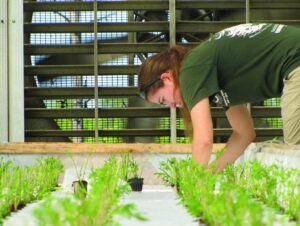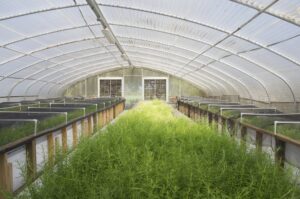Ocean scientists teach landlubbers how to raise fish and veggies, all in one system.
By Arianna Lockman
Original Air Date: Mar. 15, 2024
Host: A marine science institute in Sarasota is beginning to teach landlubbers how to raise fish in tanks in a sustainable and profitable way. They even introduced saltwater fish to the rural area of Sarasota County. Arianna Lockman has the story.
Arianna Lockman: Mote Marine Laboratory and Aquarium has launched a sustainable farming program in collaboration with Sarasota County. The “Beginning Farmer Education Program” encourages people to pursue a career in agriculture. The University of Florida’s Institute of Food and Agricultural Sciences Extension Sarasota County, also known as UF/IFAS, is a partner in this program.
Taught by Mote scientists and Extension educators, this program wants to provide new farmers with hands-on work experience and grow the workforce in food and agriculture in Florida.

USF PhD candidate Suzanne Boxman puts sea vegetables on a raft.
The Agriculture Extension agents teach practical skills such as maintaining soil health, crop cultivation, irrigation, pest control, disease control and more. Participants will also learn how to implement different business models. They will have the opportunity to connect with local supply chains and gain connections for future networking.
By now, you will probably have asked yourself what the Mote scientists contribute. It’s “aquaponics”.
This form of agriculture is a combination of aquaculture and hydroponic vegetable production. This process involves cycling nutrient-rich water from a fish tank to use as natural fertilizer for plants. The clean water is then returned to the fish tank, creating a symbiotic relationship between fish and plants. This system produces two types of food from one nutrient source.
The Ron and Marla Wolf Aquaponics Center, located at the Mote Aquaculture Research Park off Fruitville Road in the – still – rural East of Sarasota County, was established in order to expand Mote’s research with aquaponics. Most aquaponic farming involves freshwater. However, Mote is working to expand options for sustainable saltwater production. They are also working on solutions to implement this method with closed recirculating systems away from the coast.
Participants of this program will have access to a plot of land to experiment and learn. They will also receive aquaculture facilities and supplies to use throughout the course of this eight-week program. They will have the ability to design, implement, learn and adjust plans using a small plot of land to simulate their future farm.

Fish tanks and vegetable pods at the Mote Aquaculture Research Park off Fruitville Road.
This collaboration between Mote and Sarasota County will provide a low-risk, high-learning environment, with the hopes of offering a more diversified and profitable future for agriculture in Florida.
Dr. Nicole Rhody is the manager of Mote’s Marine and Freshwater Aquaculture Research Program. She hopes the local program will spread far and wide.
“We hope this program will result in more locally grown and aquaculture-derived products coming to the Sarasota market, with aspirations to share the technology developed at Mote on a national level,” she said.
Mote and UF/IFAS began prepping the land six weeks before contacting the participants of the program. Planting began at the beginning of October, and farmers harvested their crops late January to early February. This harvesting came just in time for Mote’s annual Farm to Filet event, which took place on Feb. 11. The produce harvested fed the crowd who attended the event, while they learned about the benefits of sustainable farming.
The Beginning Farmer Education Program will allow beginning farmers to make mistakes as they learn practical agriculture skills. Its implementation responds to the fact that wild fisheries are falling short to feed Earth’s population. Approximately 60 percent of oceans are fished to capacity, and 34 percent are overfished. Mote continues to strive for a more sustainable farming method while contributing to the future of the workforce in agriculture.
Reporting for WSLR News, this has been Arianna Lockman.
WSLR News aims to keep the local community informed with our 1/2 hour local news show, quarterly newspaper and social media feeds. The local news broadcast airs on Wednesdays and Fridays at 6pm.